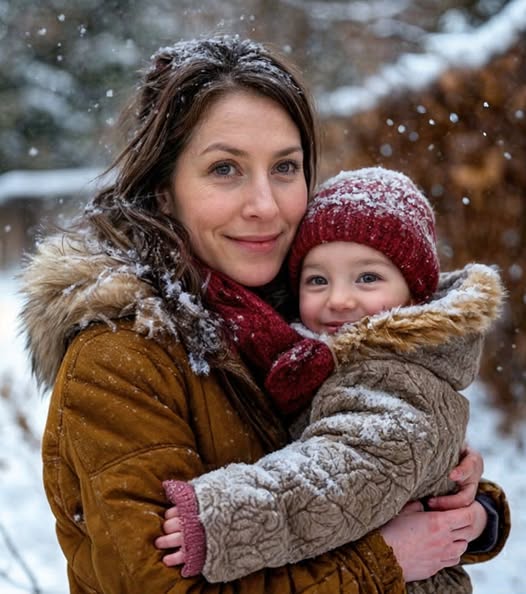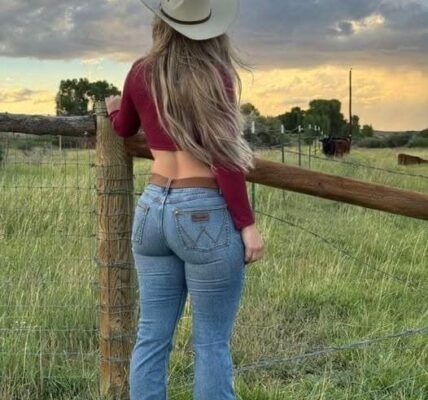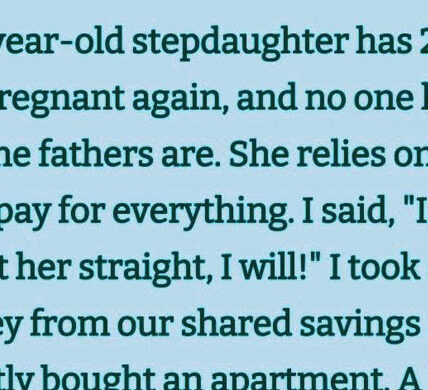Sometimes, fate delivers such surprises that you
spend your entire life marveling at how it all turned out. I still remember that chilly October day when I was returning from the market in the neighboring village. Back then, buses were rare, and I had to walk, cursing the broken road and the heavy bags of potatoes under my breath.
At forty-two, I lived alone, if you don’t count a ginger cat named Barsik, who honestly looked more like a small pillow with a cheeky face. After my divorce, neither my personal life nor my relationship with my children turned out well. I worked at the village library, knitted socks in the evenings, and watched TV shows—just the typical life of an ordinary woman from the sticks.
I was just wondering if I had the strength to drag these damn bags home when I noticed her. A little figure in a thin jacket was sitting under an old oak tree, hugging her knees. At first, I even thought I was seeing things—who in their right mind would leave a child alone between villages in such weather?
‘Girl, whose are you?’ I called out, approaching her.
She lifted her head—a pale little face, frightened eyes, and silent. She just wrapped herself tighter.
‘Are you lost? Where are your parents?’
Silence. Only her lips trembled.
‘Lord, you’re completely frozen!’ I put down my bags and sat next to her. ‘My name is Tatyana Ivanovna. And what’s yours?’
‘S-Sonya,’ she whispered faintly.
‘Sonya, will you come to my house? I’ll make you some hot tea, you’ll warm up, and then we’ll figure out where you’re from.’
She timidly nodded, and I, grabbing the bags with one hand, took her icy little hand with the other. So we went—I, huffing under the weight of the potatoes, and she, trotting alongside like a little sparrow.
At home, the first thing I did was wrap her in a blanket, turn on the heater, and put the kettle on. Barsik, usually indifferent to guests, immediately jumped onto her lap and purred like a tractor.
‘Look, he likes you,’ I smiled, pulling out some cookies. ‘And he’s picky, doesn’t just go to anyone.’
Sonya timidly petted the cat, and I noticed her shoulders relax a bit.
‘Sonya, how old are you?’
‘Five… I think.’
‘And do you know your last name? Or where you live?’
She shook her head, and I felt a tightness inside. Something was very wrong here.
That evening, I fed her soup and pies (thanks to my habit of baking in advance), put her to bed in my room, and settled myself on the sofa in the living room. I couldn’t sleep all night—I called the police, the administration of neighboring villages, but no one had reported a missing child.
A week passed, then another. Sonya slowly thawed, began to smile, especially when I read her fairy tales before bed. But she remembered nothing—or didn’t want to remember—about how she ended up on the road.
When the juvenile affairs officer shrugged her shoulders again, I realized—I had to decide something. An orphanage? The very thought made me nauseous.
‘Sonya,’ I called her one evening when she was drawing at the table, sticking out her tongue from diligence. ‘Do you want to live with me? Permanently?’
She paused, gripping the pencil, then looked up:
‘Can I?’
‘Yes. You’ll be my daughter.’
‘And can we keep Barsik too?’
I laughed:
‘And Barsik too.’
She got off the chair, walked over to me, and suddenly hugged me tightly. As I stroked her head, I thought—come what may. We’ll manage somehow.
Then, of course, the visits to the authorities began, gathering documents, checks. But that’s another story.
I remember the first day at school as if it were yesterday. Sonya clung to my hand as if they were leading her to a cage with tigers, not to the first grade. A new polka-dot dress, white bows, which I tried for an hour to make symmetrical—everything as it should be.
‘Mom, what if I can’t do it?’ she whispered as we approached the school.
That ‘mom’ still resonated warmth somewhere deep in my heart. She first called me that a month ago when I was lying down with a fever of forty, and she brought me a cup of tea, spilling half along the way.
‘Of course, you can,’ I squatted down in front of her, adjusting a bow. ‘You are my smart girl.’
‘What if they laugh?’ she lowered her eyes.
I knew what she meant. In the village, everyone knows each other, and the story of the ‘foundling’ had already sprouted a dozen versions, each more ludicrous than the last.
‘You know what?’ I pulled out a small notebook with kittens on the cover from my bag. ‘Here, hold this. You’ll write down all the interesting things you learn there. And you’ll tell me in the evening. Agreed?’
She nodded, pressing the notebook to her chest, and we went on.
The first months were tough. Sonya tried her hardest, but math was difficult for her. However, in drawing lessons, she was transformed—the quiet girl was unrecognizable when she picked up pencils.
‘Tatyana Ivanovna, could you stay for a minute?’ Marina Petrovna, the drawing teacher, called me after a parent meeting one day.
I tensed—teachers usually don’t hold you back just like that.
‘Sonya has an amazing talent,’ she pulled out an album. ‘Look at this.’
On the sheet was a landscape—our street in autumn. But the way she saw it! Every leaf, every puddle reflecting the sky…
‘We need to develop her talent. There’s an art school in the district…’
I sighed. Art school means money. And with a library salary, we were barely making ends meet.
‘I’ll think about it,’ I responded.
That evening, as Sonya did her homework and I prepared dinner, there was a knock at the door. On the threshold stood Grandma Zina, our neighbor.
‘Tan, here…’ she extended a bag. ‘Apples were plentiful this year, the girl needs vitamins. And raspberry jam.’
I was taken aback:
‘But Zinaida Nikolayevna, really…’
‘Take it, take it,’ she waved her hand. ‘And this… I sometimes do odd jobs, cleaning apartments in the city. If you want, I can recommend you. They pay decently.’
That’s how my ‘black’ weekends started—twice a month, I’d go to the city to clean. Sonya stayed with Grandma Zina, who taught her to bake pies and told her stories.
By the end of first grade, we had saved enough for art school. True, it required two bus rides, but Sonya never complained.
Problems started in middle school. Adolescence is tricky, and then there were those eternal questions about the past.
‘Why did they leave me?’ she asked one evening as we drank tea. ‘Was I bad?’
My heart clenched.
‘Sonya, listen…’
‘No, you listen!’ she jumped up, overturning the cup. ‘All normal people know who their parents are! And I… I’m nobody! A foundling!’
‘Stop it!’
‘What, does the truth hurt?’ she stormed out of the kitchen, slamming the door so hard that plaster fell.
Barsik, aged and even more corpulent, scurried under the sofa.
I didn’t follow her—I knew it was pointless. In such moments, it’s better to let her cool down. I sat in the kitchen, mechanically wiping up the tea spill, thinking—maybe I did something wrong? Maybe I should have then…
The front door slammed. I jumped up—it was almost ten at night.
‘Sonya!’
Silence in response.
Throwing on a jacket, I rushed outside. The rain drizzled, every other streetlight was out. Where could she have gone?
I ran down our street, then the next. I checked the playground—empty. Horrible images spun in my head—maniacs, accidents, dogs…
She was found at the old cemetery—sitting on a bench near Grandma Zina’s grave, who had died a year ago.
‘Sonya…’
She lifted her head—soaked, teeth chattering.
‘I’m sorry,’ she whispered. ‘I didn’t mean to…’
I silently took off my jacket, draped it over her shoulders, and sat next to her.
‘You know,’ I said after a long silence, ‘when I found you, I thought—well, she’ll stay a bit and leave. To an orphanage or to relatives, if they’re found. But then… then you started drawing those doodles on the wallpapers…’
‘They were unicorns!’ she protested through tears.
‘Yeah, especially that purple one, with three tails,’ I smiled. ‘And I realized—I won’t let you go. Because you’re mine. Not by blood, but by heart. And I don’t care who your real parents are. For me, the real one is you.’
She buried her face in my shoulder and sobbed. We sat like that, probably for 10 minutes—wet, frozen, but somehow… purified, I guess.
‘Mom,’ she said as we walked home. ‘Can I repaint my room? In purple?’
‘The one with a violet shade or the one with a pinkish tint?’
‘I don’t know,’ she shrugged. ‘Let’s try both?’
The following weekend we spent painting the walls. I still couldn’t figure out which shade it ended up being, but Sonya was happy.
By the age of fifteen, she already knew she wanted to be an artist. Her works regularly won at district contests, and one was even sent to a regional exhibition.
‘Mom, look!’ she burst into the house, waving some paper. ‘I’ve been invited to a master class at the art school! In the city, for a whole week!’
I felt a chill. A week in the city—accommodation, food, materials…
‘Great,’ I forced a smile. ‘When?’
‘In a month!’ she flopped down on the sofa next to me. ‘Imagine, there will be a real artist from Moscow! And they’ll teach us to paint with oil!’
That evening, I took out the stash—a small part of what I had saved for her college fund. I counted it—should be enough. We’ll figure something out.
That week changed everything. Sonya came back different—matured, with sparkling eyes and a firm intention to apply to the art school after ninth grade.
‘But what about school?’ I was bewildered.
‘I’ll take external exams! The teacher said I have all the chances to get in on a budget. Can you imagine?’
I could. I imagined her moving to the city, how I’d stay alone in this house, every corner soaked with memories. How I’d wait for her letters and her rare visits on weekends.
‘Mom,’ she sat next to me, taking my hand. ‘I won’t leave forever. I’ll come every weekend. And then I’ll return—to set up an art studio for kids here. You’ll see!’
I looked at her—not a child anymore, but not yet an adult. A stubborn chin, eyes that turn green when she’s nervous. My girl. When did she grow up?
‘Alright,’ I said. ‘But on one condition.’
‘Which?’
‘You’ll send me all your works. I want to be the first to see your masterpieces.’
She laughed and hugged me tightly.
That evening, I couldn’t sleep for a long time. I went out to the porch, sat on the old bench. Somewhere far away, dogs barked, and it smelled of ripe apples from Grandma Zina’s former garden. Life is strangely arranged—it goes on, follows its usual course, and then suddenly—bang!—and everything changes because of one encounter on the road, one decision, one moment…
‘Mom, why aren’t you sleeping?’ Sonya came out, wrapped in a blanket. She sat next to me, resting her head on my shoulder.
‘I was just thinking.’
‘About what?’
‘About how quickly you’ve grown.’
She was silent for a moment, then said:
‘You know, sometimes I think—what if you had walked past that day? Or if I had been somewhere else?’
‘I don’t know,’ I hugged her shoulders. ‘I guess it was meant to be.’
We sat on the porch until dawn, making plans for the future and reminiscing about the past. In the morning, I started gathering documents for her external exams.
Her readiness for college became our common cause. I worked two jobs, she studied at night, preparing for exams. At times, it seemed we wouldn’t make it, we’d break. But we managed. She got in.
Time in the city changed Sonya. She spread her wings—new friends, exhibitions, creative evenings. In the first year, she called every day, then less often, but always sent photos of her works. I printed them and hung them on the walls—creating a whole gallery.
The house without her seemed unusually quiet. Even Barsik, who by then had turned into a real old man, wandered the rooms mournfully, as if looking for someone.
‘Mom, just don’t worry,’ she said once over the phone. ‘But I think I’ve found a way to learn about my past.’
Inside, everything in me froze.
‘What do you mean?’
‘Remember that jacket I was wearing? Do you still have it?’
Of course, I kept it. The little blue jacket lay in the back drawer of the dresser along with other keepsakes.
‘There’s a tag in the lining with the name of a tailor shop. I found it—it’s still in business! Maybe they remember who ordered the jacket?’
I was silent, not knowing what to say. On one hand, I understood her desire to know the truth. On the other…
‘Mom? Are you there?’
‘Yes, dear. Just… are you sure you want to know this?’
She was silent, then said softly:
‘I need to close this door. Otherwise, it’ll remain ajar.’
I took out the jacket. It still smelled of mothballs and, strangely, apples—probably from being stored next to jars of jam in the dresser.
A week later, Sonya came home—thin, with dark circles under her eyes.
‘Well?’ I asked, seating her at the table and pouring tea.
‘Nothing,’ she shook her head. ‘The shop changed owners, all the old order journals are gone. Dead end.’
She suddenly burst into tears—the first time in many years.
‘You know what’s funny? I don’t even know what I wanted. Find them? And then what?’
I hugged her, stroking her back:
‘My dear…’
‘No, really,’ she wiped her eyes. ‘Imagine—I had found them. And what? Would I have said, «Hello, I’m that same girl you left many years ago. How are you?»‘
She bitterly smirked:
‘And then I sat in the bus and thought—it’s they who lost, not me. They lost the chance to see how I grow, draw my first pictures, get into school… And you—you’ve been there all along. You’re the real mom, not the one who gave birth to me.’
I was silent because I couldn’t speak—a lump in my throat got in the way.
‘Remember the day you found me?’ she suddenly asked.
‘Of course.’
‘I remember more than I said. I remember being taken out of the car, told to wait… I sat there almost a day until you came.’
She went to the window:
‘You know what I realized? Sometimes people leave your life so that others—the real ones—can appear.’
Two years later, Sonya organized her first personal exhibition. I came to the city, dressed up and excited, with a bouquet of wildflowers—her favorites.
The gallery was full of people. Fashionably dressed women, men in expensive suits, artists with beards—all discussing my girl’s paintings. And I walked from work to work, my heart ready to burst with pride.
‘And here’s the heroine of the day!’ a voice called from behind.
I turned around—a gray-haired man in a tweed jacket extended his hand:
‘You’re Sophia’s mother, aren’t you? I’m her painting teacher. You know, your daughter has an amazing talent—she sees the soul of things.’
‘My daughter’—how wonderful that sounded!
‘Mom!’ Sonya made her way through the crowd to me. ‘Come on, I want to show you something.’
She led me to a large painting at the back of the hall. I froze.
In the painting, I saw our old road—the same one, broken, with tractor ruts. The huge oak we always called ‘grandfather’ spread its gnarled branches. And under it—two figures: me, with shopping bags (God, she even remembered my ridiculous green raincoat!), and tiny Sonya in that same blue jacket. We were holding hands, and around us, red leaves danced. And you know what’s most amazing? From somewhere above, right through the gray clouds, a golden ray of light shone—just like that day. I didn’t even remember it, but she… she remembered.
‘It’s called «The Encounter,»‘ Sonya said softly. ‘Do you like it?’
I looked at the painting, and our whole life flashed before my eyes—first steps, first joys and grievances, ups and downs, quarrels and reconciliations… Twenty-five years that flickered by like one day.
‘Thank you,’ I whispered.
‘It’s to you, thank you,’ she hugged me tightly. ‘For everything.’
That evening, we sat in her rental apartment, drinking tea with cake and talking about everything under the sun. On the wall hung a photo of Barsik—he had passed away last winter, quietly and peacefully, in his sleep.
‘By the way,’ Sonya suddenly bustled, ‘I have news for you. Remember I talked about the art studio in our village?’
I nodded.
‘Well, I applied for a grant. And…,’ she paused, ‘they approved it! Can you believe it? Now we’ll have our own studio!’
‘In our village?’ I couldn’t believe it.
‘Why not?’ she shrugged. ‘Children grow up there too. And they also need art. Besides…’ she squinted slyly, ‘someone has to look after you in your old age.’
‘Ah, you!’ I jokingly swung a towel at her.
She dodged with a laugh:
‘Just first, we need to do some repairs on the house. The porch has really deteriorated…’
‘And the fence is leaning,’ I chimed in.
‘And the garden has overgrown…’
We looked at each other and laughed. So many plans ahead, so much hope!
And the painting ‘The Encounter’ now hangs in our living room. And every time I look at it, I think: how wonderfully life is arranged—sometimes you just need to not walk by, to find the most important thing.»




